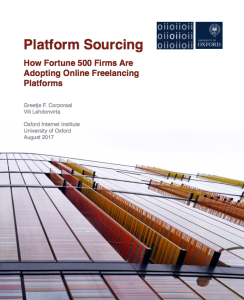Online labour platforms allow companies to source work from freelancers over the Internet on an on-demand basis. We know that this phenomenon grew about 26 percent globally over the past year, and there is an increasing amount of research available on workers who work through these platforms (including our own). But there is a gap in research when it comes to understanding the companies that hire online freelancers. Why do companies use online freelancing platforms? And how do they go about doing it in practice? A new report written by Gretta Corporaal and myself presents answers to these questions; the report is titled Platform Sourcing: How Fortune 500 Firms are Adopting Online Freelancing Platforms.

The report is based on case studies of seven Fortune 500 firms (top-earning US companies) and two large multinational enterprises. These included tech companies such as Samsung, but also food, household products, and healthcare companies. One of the most surprising findings is the fact that these very large corporations are using online freelancing platforms in the first place. It’s one thing when independent consultants and startups experiment with new ways of organizing work; it’s something else when corporations employing hundreds of thousands of people adopt such models. The companies were using online freelancers in many functions, ranging from marketing and customer support to product development and networks. In five of the cases platform sourcing was used only in some specific areas of the company, but in four cases firms were in the process of scaling up platform adoption across the enterprise.
Three motivations, many practices
We identified three motivations for platform sourcing among the enterprises that we studied: it provides access to a scalable source of labour, skills and expertise; it reduces start-up and transaction costs compared to conventional sources of contingent labour; and it reduces conventional hiring barriers such as geography. In other words, enterprises were seeking classic numerical flexibility and access to skills from freelancing platforms. But they were also seeking advantages in innovation and knowledge creation that come from making the corporate boundary more permeable and accessing workers outside their usual channels, with different backgrounds and work histories.
We also saw that enterprises faced various challenges in adopting online freelancing platforms. These included overcoming internal resistance, preventing increased coordination costs, and adapting platforms to the firm’s existing socio-technical infrastructures, such as procurement policies and vendor management systems. Some of the steps that the companies took to organize the platform adoption process included creating spaces for experimentation with platform use, creating a programme management layer, and involving stakeholders such as finance and human resources early on.
Managers experienced with platform sourcing provided hints on the best practices that they had developed. Interestingly, the managers that we spoke with argued that online freelancers should be used to augment rather than replace in-house employees. One manager explained that a core group of people was necessary to create a culture into which freelancers could be socialized. This approach also neutralized internal resistance to platform adoption.
Sustainable ecosystems?
Looking ahead, we also examined what steps some of the enterprises were taking to adapt platform sourcing into a mature and sustainable organizational model for the longer term. Some managers recognized that more open and flexible sourcing models such as platform sourcing increased the firm’s mutual dependence with the external environment, that is, with freelancers and platform companies. In the report we therefore recommend that platforms and their enterprise clients consider how they could support the development of sustainable ecosystems around platforms, making online freelancing one of many attractive and sustainable career opportunities for skilled workers, as well as an attractive organizational model for enterprises.
Suggested citation:
Corporaal, G.F., & Lehdonvirta, V. (2017). Platform Sourcing: How Fortune 500 Firms are Adopting Online Freelancing Platforms. Oxford Internet Institute: Oxford.




